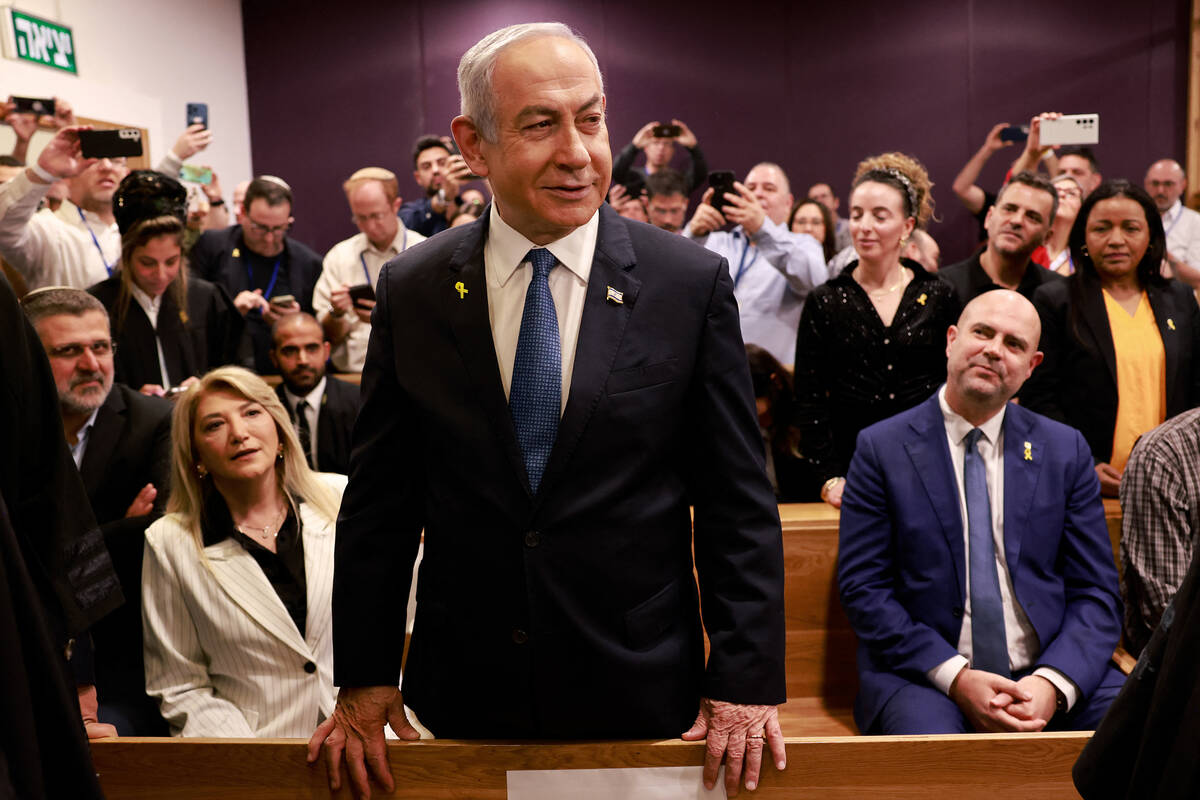Netanyahu is first Israeli PM to testify at own graft trial
Israeli Prime Minister Benjamin Netanyahu took the witness stand for the first time in a corruption trial in which he’s accused of bribery, fraud and breach of trust, a case that’s played havoc with the nation’s political life for nearly a decade.
His testimony is scheduled for three times a week, six hours a day, over several weeks, meaning that as Israel fights a war in Gaza, bombs military sites in Syria and takes part in a ceasefire in Lebanon, its leader will be on a witness stand in Tel Aviv.
It’s the first time in Israel’s history a sitting prime minister will defend himself in court in his own case. Netanyahu and his team tried repeatedly to delay the sessions, while opponents petitioned the Supreme Court asking that he be declared “temporarily incompetent” to run the country’s affairs during the testimony.
Both efforts failed, but they symbolize the intense divide over the cases in a way not dissimilar to how prosecutions against President-elect Donald Trump divided Americans.
Netanyahu, 75, and his supporters view the cases as a naked effort by the liberal establishment to remove him from political life, something it has failed to do through the electoral process. He’s the country’s longest-serving prime minister.
“I’ve read the materials and I’m amazed by the magnitude of the absurdity,” Netanyahu said in court on Tuesday. “I will tell the truth as I remember it. I want to speak and hope that we won’t be disturbed. I still think it’s possible to wage war and peace and also a trial.”
Netanyahu will be questioned by his defense team and by the attorneys of three other defendants in the first few days, before being cross-examined by the prosecution.
If convicted, the charges against Netanyahu carry jail time, though whether or not he would go to prison as prime minister is unclear due to the unprecedented nature of the case. He would probably need to resign for that to happen.
Due to the security situation during wartime, the trial was moved from Jerusalem to a courthouse in Tel Aviv which has an underground maximum security room.
‘Unfounded accusations’
At a news conference Monday night, Netanyahu denied he tried to avoid his testimony. “For eight years I have been waiting for this day,” he said, “to finally blow up the delusional and unfounded accusations and expose a brutal hunting method.”
The cases against Netanyahu have had a major impact on Israel’s political life since party leaders to the center and left have refused to join a government led by him in recent years. As a result, the PM brought the far right into his coalition after elections two years ago, making it the most right-wing religious government in the country’s history.
The investigation against Netanyahu began in 2016. He was indicted five years ago in three different cases involving owners of major media: Shaul Elovich, formerly the controlling shareholder of Bezeq, his wife Iris, and Arnon Mozes, the publisher and main stakeholder of Israeli media powerhouse Yedioth Aharonoth.
In the case involving Elovich, known as 4000, Netanyahu is accused of attempting to adjust regulation to benefit his company. The prosecution has said the benefits were worth 1.8 billion shekels ($500 million) to Elovich. In turn, the prime minister sought favorable coverage for him and his family in news website Walla, then owned by Bezeq.
Referring to this case, Netanyahu didn’t deny signing a relevant document, but complained that his staff didn’t properly explain it. His attempts to get supporters to invest in Israeli media were part of his efforts to save Israeli democracy, he said.
In case 2000, Netanyahu is accused of offering Mozes, the newspaper publisher, to pass a law limiting distribution of a main competitor in exchange for positive coverage. The law never achieved a majority in parliament. Netanyahu has strongly denied both the above allegations, as have Elovich and Mozes.
In the third case, 1000, Netanyahu is accused of receiving gifts from Hollywood producer Arnon Milchan and businessman James Packer that included cigars and cases of pink champagne. In exchange, the charges say, Milchan sought help on extending his U.S. visa and on changing tax laws to his benefit, something he denies.
The scope of the gifts was approximately 700,000 shekels ($200,000). Netanyahu has rejected the allegations, saying the gifts were gestures from friends, not a quid pro quo.
“I work around the clock — there is no leisure time,” he said in court. “I occasionally sin with a cigar that I can’t even smoke in peace because of constant interruptions. I never drink alcohol, I just don’t like it. Its not really a life.”

















